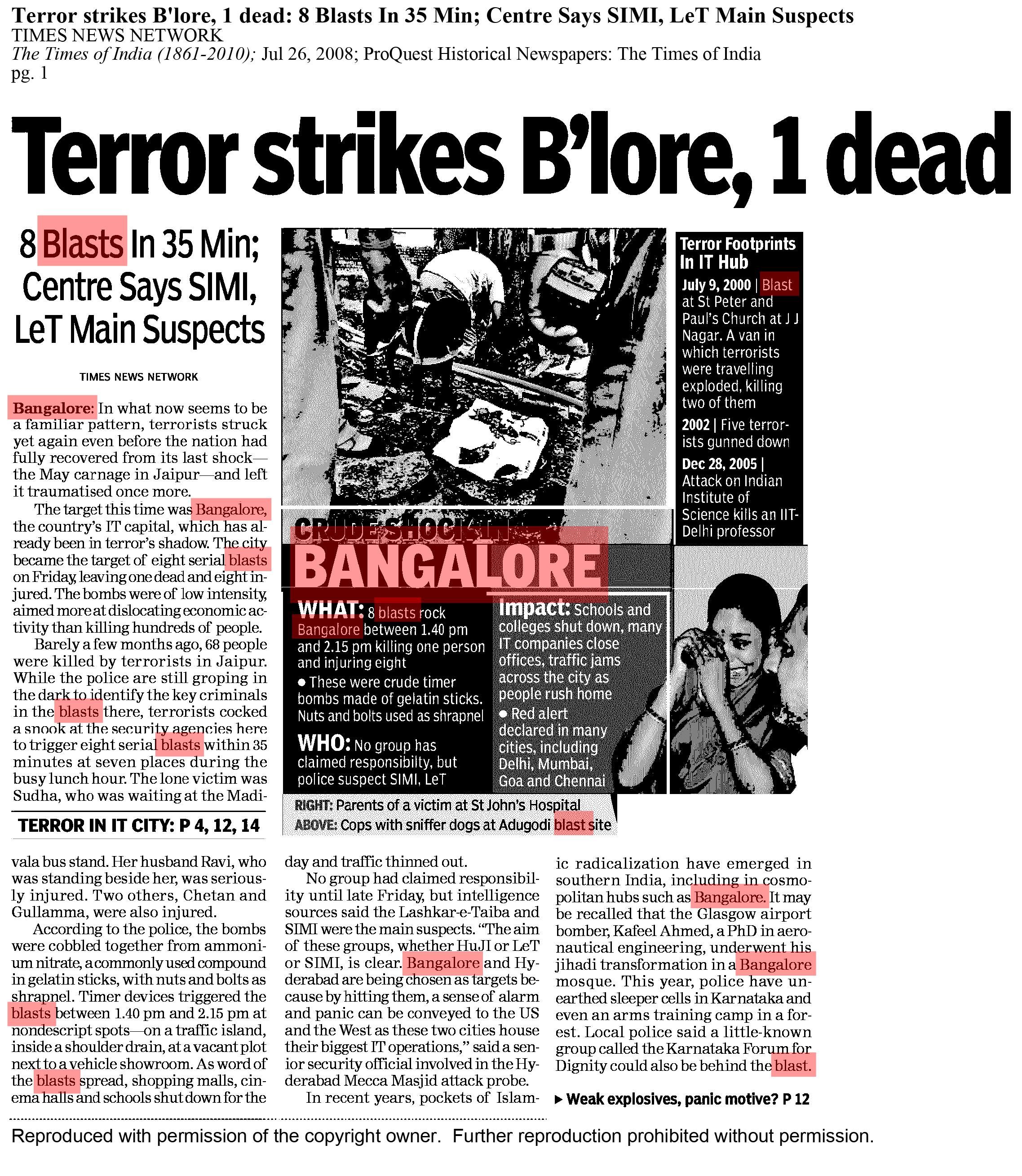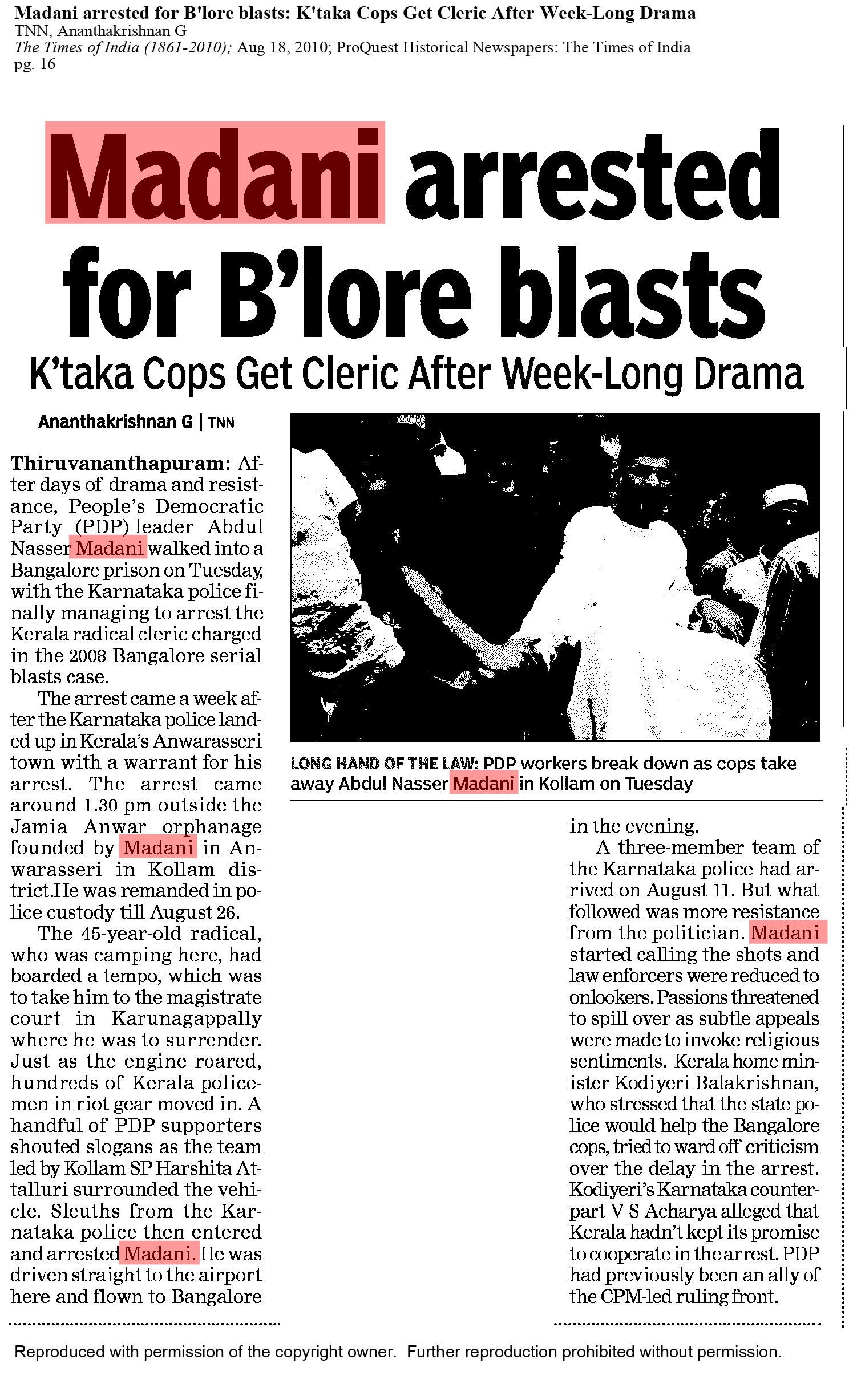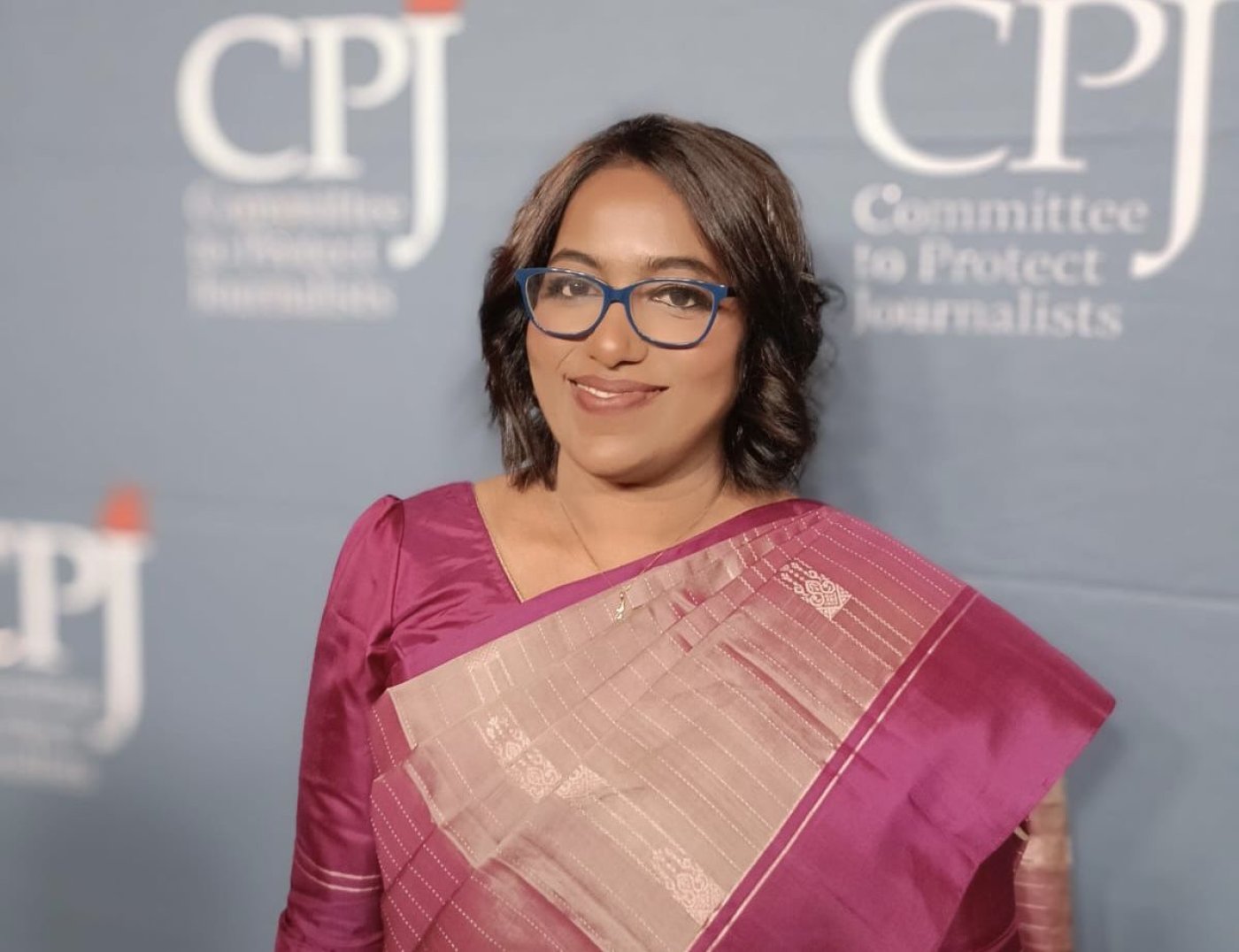Kolkata: Sometime in 2010, a traffic policeman in Thiruvananthapuram waved journalist Shahina K K to pull over over. She had forgotten to put on her helmet on her two-wheeler, realising it as soon as she saw the policeman gesturing. As he approached, his expression changed.
“I didn’t realise it was you,” he said, apologetically.
“But I’ve made a mistake,” Shahina, now 49, told him. “Let me pay the fine.”
“No ma’am, please! This is a very small case for you,” the rueful policeman said. “It doesn’t behove your stature.”
Shahina had told me this story in 2011, when we were colleagues at OPEN magazine, a year that she spent in the shadow of being arrested at any moment for a non-bailable charge. In 2010, she became arguably one of the first journalists in India to be charged under the Unlawful Activities Prevention Act (UAPA), 1967, for her reporting on a police investigation into the 2008 Bangalore bombings that killed one and injured 20 people.
A series of eight crude bombs exploded between 1:40 pm and 2:15 pm on 25 July 2008, The Times of India reported. On 17 August 2010, Kerala People’s Democratic Party leader Abdul Nasser Madani was arrested for his involvement in the blasts. He was the 31stt accused in the case.
Shahina wrote a story for Tehelka magazine, questioning Madani’s arrest, based on interviews of prosecution witnesses. Consequently, Shahina became among the first journalists in India to be charged under a law that is primarily used to curb terrorism.
In 1998, Madani had been arrested for his involvement in the 14 February Coimbatore blasts that killed 58 persons. He was exonerated in 2007, after spending almost a decade in jail. In 2009, his wife Soofiya was arrested on charges of burning a Tamil Nadu government bus in Kochi in 2005. In other words, Shahina wrote a story about a man who had been in jail on charges that were not proven in court.
“Madani may or may not be innocent,” Shahina said in a speech at the Chameli Devi Jain award ceremony in 2011. “My story was not at all on the merit of the Bangalore blast case but on the fabrication of a conspiracy theory by the police.”
It was 16 November 2010 when Shahina was called by the Karnataka police. Exactly 13 years later, on 16 November 2023, she received the International Press Freedom Award from the Committee to Protect Journalists.
Edited excerpts from an interview:
Tell us the events of your detention or arrest.
I was in Madikeri, interviewing three witnesses named by the Karnataka police in the chargesheet against Madani. Madikeri is on the border between Kerala and Karnataka. In Kerala, I had heard from police sources that the chargesheet against Madani was cooked up. When I interviewed the witnesses in Kerala, I found that one of them was in the ICU of a hospital in Ernakulam on the day that his testimony was supposedly taken. The hospital records showed that. So there was good reason to question the chargesheet against Madani. My managing editor Shoma Chaudhury in Tehelka gave me permission to go to Madikeri to interview the Karnataka witnesses.
I had finished interviewing a witness called KB Rafeeq, who told that he had been tortured to say that he had seen Madani, and an RSS activist called KK Yogananda who was unaware that he had been named in the chargesheet. After I left Yogananda’s place, I was talking to some local residents when the police asked me to leave the area. I showed them my press card and they told me it is best that I leave the place.
Some days after that, my contacts there told me that an FIR had been filed against me in Madikeri. And my local translator and a third person, who was helping us find the place. So, I was not arrested physically, so to speak.

You had to find out about the FIR against you? What were the charges?
Yes, I had to find it out myself. The initial charges under the Indian Penal Code, 1860 were under sections 506 (criminal intimidation of witness), 149 (unlawful assembly with the object of a crime), and 34 (criminal act done by several persons in pursuance of a common intention). In Karnataka, criminal intimidation of witnesses is a non-bailable charge [in Kerala, it is not]. The police could arrest me any time.
The UAPA charge was not there initially. I approached the Madikeri Sessions Court for anticipatory bail on 13 December 2010. On 18 December, a day that was posted for order, the prosecution charged me under section 22 of the UAPA and I was denied bail.
That was the beginning of the most horrible seven months of my life.
You are considered to be among the first journalists to be charged under the UAPA.
I believe there is a tribal identity (sic) journalist from the Northeast who was also charged under it. Perhaps journalists have also been charged under other anti-terrorism acts such as Pota (Prevention of Terrorism Act, 2002) and MCOCA (Maharashtra Control of Organised Crime Act, 1999). I did a lot of googling because we [my lawyers and I] wanted to see the recourse open to me, but I did not find definitive answers. But, yes, it was not usual to charge journalists under UAPA.
I had to be on the run constantly because the [Karnataka] police could arrest me at any time. My son was four years old at the time, and he could not go to school because we were always moving from one place to another. This continued until the Karnataka High Court gave me bail in July 2011.
The UAPA is widely called a Congress creation, which is chronologically correct—the Act was passed in 1967. The government in Karnataka that charged you under it in 2010 was led by the Bharatiya Janata Party.
Yes. But FIRs have been filed against journalists before 2014 as well. Journalists have been accused of sedition [sec 124A, where punishment is imprisonment for life or three years]. Every FIR has a chilling effect. One may say that there has been an escalation in this trend since 2014.
What was the toughest condition(s) of your anticipatory bail?
I had to present myself for a police interrogation that lasted seven-eight days in Bangalore. It began in the morning and continued late into the night. They grilled me. Some of the questions seemed so stupid that I would get annoyed. But that is what they wanted. It was like psychological torture.
Another condition of my anticipatory bail was that I had to present myself to the investigating officer in the case in Bangalore every two weeks. Effectively, every 10 days, I had to uproot myself from Kochi and go to Bangalore, because each trip took three to four days. I would take the train to Bangalore, present myself at the police station, take the train back. This continued for 7 months, until they relaxed the requirement to present myself once every month. It’s not easy to live like this.
In December 2011, I was summoned to a court in Somawarpet for an identification parade, which was a total charade. A group called Hindu Jagran Vdeike pelted stones at the police vehicle in which I was taken and tried to manhandle me. The police told me they would not be able to offer any protection when the goons advanced menacingly towards me. The police officers were openly colluding with one of the petitioners in the case, who was an RSS activist.

An intrusive question but it would be of interest to those facing similar charges: have you had help funding your legal expenses?
The bulk of my expenses—I would say 90%—I have had to fund myself. I have had applications in the sessions court, Karnataka High Court and Supreme Court. Even if lawyers give me a discount or offer pro bono services, there are still court filing expenses.
And when you say legal expenses, there is also the cost of travelling to court: once the trial started, I had to go to Madikeri Sessions Court approximately once a month. Each trip cost me Rs 12,000 one way because there is no public transport there. Unlike Bangalore, I cannot take a train there. I have to book a cab every time. I stayed in a hotel overnight.
Before this, I had to travel to Bangalore until the trial started.
When did your trial start?
The police filed charge sheets before the Madikeri and Somawarpet courts in 2013. In January 2015, the Madikeri court committed the case to the Madikeri Sessions Court. However, I had moved a petition for the case to be heard in the special NIA (National Investigation Agency) court, which has just been allowed. So the trial will start afresh here. But at least, I can take a train here because the NIA court is in Bangalore. It will be less expensive.
[The NIA courts are fast-track courts, experienced in matters related to terrorism law.]
Did the publications you worked in help you?
I was in Tehelka when I was charged. The story mentioned in the police chargesheet, ‘Why is This Man Still in Prison’ was published in Tehelka in November 2010. They paid the lawyers’ fees in the Karnataka High Court to move my anticipatory bail application. The managing editor Shoma Chaudhury had written three-four paragraphs in her column about intimidation of journalists becoming a trend.
After Tehelka, I worked in OPEN (with you). The editor Manu Joseph appeared in a press conference in my support.
But as I have told you, more than 90% of the expenses have been borne by me. And the psychological and emotional ordeal is 100% yours alone.
In recent years the UAPA has been weaponized against dissenters. Sixteen Indian journalists face charges under this draconian act. What have you observed about the increased use of this act?
I would say that there is definite escalation. But journalists have been charged with criminal offences for a long time in India. Most commonly, they were charged for sedition.
As a Muslim woman journalist what kind of harassment have you faced in New India?
If you look at the people charged under the UAPA—not only journalists but everyone—you will see that the majority are Muslims. I have not checked for Pota or MCOCA, see what you find there.
If my name was Sohini and not Shahina, it may have been that I would not have charged.
But now things are changing. There are now cases against high caste Hindus, even Brahmins—look at the Bhima Koregaon case, look what happened to Siddharth Varadarajan. It is not only your name, if your work is critical, you are a threat.
(Sohini Chattopadhyay is an award-winning journalist, editor and national-award winning film critic. Her book The Day I Became a Runner: A Women’s History of India Through the Lens of Sport is published by HarperCollins India.)
Get exclusive access to new databases, expert analyses, weekly newsletters, book excerpts and new ideas on democracy, law and society in India. Subscribe to Article 14.

